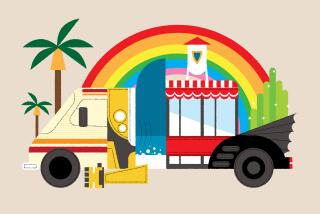Warner Bros. Scales the Great Wall
Hollywood always talks about respecting the “Chinese Wall” that exists in deal making. Now it’s broken one down. Warner Bros. on Monday announced a landmark agreement to distribute movies in China, home to the world’s largest film audience.
An unspecified number of Warner movies will be shown in key Chinese cities beginning this fall under the “experimental” agreement with China Film Distribution, Exhibition, Export & Import Corp., the communist country’s sole film importation agency. If the partnership succeeds, other Hollywood studios are expected to follow Warner’s lead.
Hollywood sees China as one of the last great frontiers and is committed to building the movie theaters needed to bring it into the modern age. But analysts caution that the market won’t spring to life overnight. Sources estimate that fewer than 8,000 of the country’s movie screens meet U.S. standards, and the average ticket price is said to be about 50 cents.
Further, a lot of films could also be turned away because of China’s rigid social policies. Still, with its 1.2 billion people, it’s an irresistible target. “Everybody wants to get into China,” said entertainment analyst Jeffrey Logsdon of Seidler Cos. “It’s an enormous market.”
The Warner Bros. agreement is the result of a months-long initiative by co-Chairmen Robert Daly and Terry Semel and other executives who traveled to Beijing in April. Warner executives declined to comment further on the deal Monday, apparently out of concern for cultural sensitivities. In its formal announcement, Warner said it will split the revenue from its films shown in China with China Film. It will also open a China office.
One issue the distribution agreement does not address is piracy. Motion Picture Assn. of America President Jack Valenti says the practice is still “out of control” in China, but he added that the Warner deal could encourage the Chinese to take measures to protect “legitimate product.”
*
When Merritt Blake, Tom Chasin, Martin Hurwitz and Marion Rosenberg started meeting regularly for breakfast last year, people assumed they were negotiating a merger of their four talent agencies. But it turns out that something more aberrant was happening: a collaboration.
Forgoing Hollywood’s usual obsession with secrecy, the four agents are informally trading information and insights as a way to better survive in a jungle dominated by behemoths such as Creative Artists Agency, International Creative Management and William Morris Agency.
During twice-monthly meetings at the Regent Beverly Wilshire Hotel, they tip one another to upcoming business opportunities. They also trade industry gossip and have even held some meetings with TV and studio executives as a team.
“This is an alternative,” says Blake, whose clients include Tyne Daly and Wilford Brimley. “It’s a window for information a small agency might not receive.”
One recent case of cooperation involved Rosenberg and Hurwitz. When Rosenberg sold the rights to the book “Swift Justice” to CBS, Hurwitz brought in his client, best-selling author Joseph Wambaugh, to write the teleplay. In another instance, Blake turned to Hurwitz for help in structuring an executive producer deal for Daly, who had come to him with an idea for a TV pilot.
Hurwitz says they’ve had no complaints. “A client has to be self-confident to be with an independent agent to begin with,” he said. “And as agents, we all respect each other and are very secure about our relationships and individual businesses.”
Rosenberg, whose clients include “Basic Instinct” director Paul Verhoeven, says the partnership also makes it easier to stay current in an era of agency consolidation and emerging technologies.
All four say they’ve turned down other agents’ requests to join their grown-up version of The Breakfast Club. Chasin maintains that the partnership works because they started as friends and remain close, even though they see no point in formally joining their businesses. “We’re basically lone wolves,” he said.
*
As part of a revised marketing strategy, Walt Disney Co. has come up with a new name for its troubled Euro Disney theme park: Disneyland Paris. By symbolically linking the massive park to the City of Light, Disney hopes to attract more tourists staying in Paris.
Euro Disney, which is roughly 45 minutes outside of Paris, will keep that corporate name but will be called Disneyland Paris in promotions. To boost off-season attendance, Disney is also planning seasonal themes. This autumn’s will be “Festival Far West,” with Disneyland Paris offering country music concerts and promoting the park’s cowboy-theme amenities, according to the company.
A theme at a theme park seems natural enough, though Disney has been tripped up by the cowboy motif before. When the park opened several years ago, a doorman dressed as a fashionable ranch hand was supposed to greet arriving hotel guests with a hearty “Howdy!” The problem was, in his heavily accented English, everyone thought he was yelling “Audi!”
More to Read
The biggest entertainment stories
Get our big stories about Hollywood, film, television, music, arts, culture and more right in your inbox as soon as they publish.
You may occasionally receive promotional content from the Los Angeles Times.










